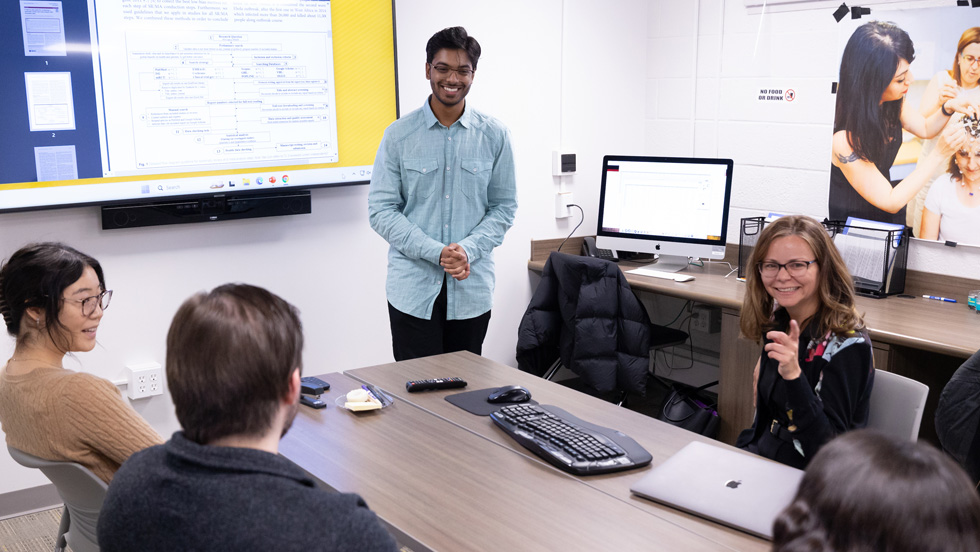
Inspired by his grandfather’s struggle with Broca’s aphasia, molecular neuroscience major Hemish Naidoo explores scientific literature for patterns in language loss. His goal is to find clues that could inform future treatments and support those affected by similar conditions.
Scientific literature is filled with research related to language loss and the ways in which a variety of neurological and psychiatric disorders can have a negative impact on the ability to speak. The existing studies often approach the problem using different methodologies. Might a systematic analysis of the published research reveal commonalities that could be clues to treatment?
Hemish Naidoo, a molecular neuroscience major (a multidisciplinary program offered through the Gordon F. Derner School of Psychology and the College of Arts and Sciences), has spent the summer exploring that possibility, and for him, the mission is personal as well as academic. His grandfather, whom he refers to as “my first friend,” developed a disease known as Broca’s aphasia, in which the ability to speak spontaneously and link words correctly is lost.
“His mental state deteriorated over a period of years until I could no longer communicate with him,” Naidoo said. “I realized how simple neurological malfunctions can sever the most intimate of bonds, no matter how unshakable they may seem. It inspired me to learn how neuropsychiatric research, alongside appropriate clinical care, could improve the lives of those like my late grandfather.”
Pairing Student and Mentor
Naidoo, who is minoring in biology and Asian studies, is also a member of Adelphi’s Honors College. He was paired with a faculty language expert through the Honors College Summer Fellowships program. His faculty mentor is Sladjana Lukic, PhD, assistant professor of communication sciences and disorders in the Ruth S. Ammon College of Education and Health Sciences.
Naidoo applied to assist Dr. Lukic’s research project, “Connected Speech Patterns in Schizophrenia and Dementia,” and was accepted last spring. Their research began in June, following the close of Adelphi’s academic year. They have been conducting a systematic review and meta-analysis of the relevant literature, looking for both similarities and differences across published studies. Their research has been taking place in Adelphi’s neurobiology of language and behavior (NoLaB) lab, in which researchers focus on the neurocognitive correlates of the language system and its relation with emotions and other cognitive systems.
“Psychiatric and neurological diseases with significant language deficit can have different root causes,” Dr. Lukic said. “These disorders can be characterized by either neurodevelopmental syndromes, such as schizophrenia, or neurodegenerative syndromes, such as behavioral variant frontotemporal dementia. In our literature review, we began by looking for promising articles, then for patterns or inconsistencies among them.”
Dr. Lukic noted how important it is for a young investigator to spend focused energy on understanding the contemporary status of a research problem, and that takes time.
“Hemish did a great job collecting a good volume of published data on this topic, but there is still a lot of work in front of us [and] we are moving in the right direction,” she said. “It is a rare and unique opportunity to start your research training in a field with such profound impact on clinical practice, and I believe that Hemish is well-suited for this task. Hemish will next move toward learning how to organize collected data and write an analytical report. Down the road, the idea is to conclude this effort with a published manuscript.”
An Analytical Challenge
Naidoo said that one of the challenges of the project has been looking at studies that explore the same problem but from different perspectives.
“For example, one study may try to get patients to speak by taking a structured test. Another may ask patients to describe a picture,” he explained. The team plans to utilize Lateral.ai. and Hume.ai, artificial intelligence software programs that read and organize research, and convert human emotions into spoken words, respectively. “Automated language systems take recordings of patients’ speech and mark sections where they pause or stutter, but they often employ different software,” he added.
The conclusion of the summer fellowship is a final report to be submitted to the Honors College, but that isn’t the end of their partnership. Naidoo and Dr. Lukic plan to continue working together on a related project or possibly with findings they may have discovered in their meta-analysis.
Naidoo wishes to enter an MD/PhD program after graduating from Adelphi. “This systematic review/meta-analysis is my first stepping stone in that journey,” he said. “I hope to become a compassionate physician-scientist who can develop and apply treatments that can preserve the relationships between grandparents and their grandchildren. I want to ensure that the words that need to be said and heard, and carried with love, always reach their destination.”